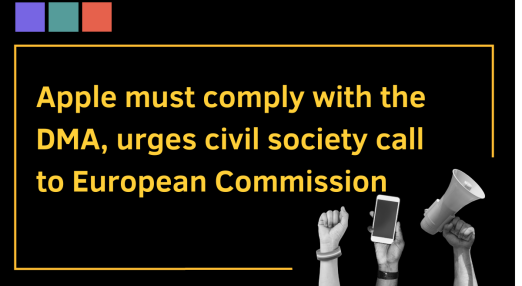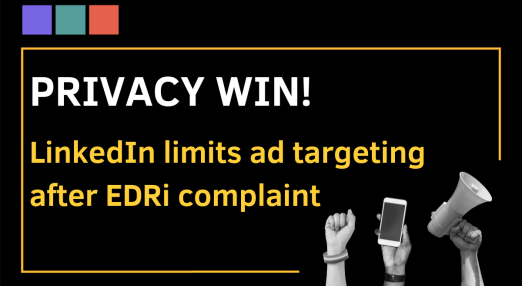The ePrivacy Regulation proposal has been withdrawn, but the fight for your privacy is far from over
The European Commission's withdrawal of the ePrivacy Regulation proposal is a major setback for privacy rights in Europe, driven by pressure from industry interests and national security concerns. However, EDRi remains committed to advocating for stronger privacy protections, challenging commercial and state surveillance in future legislative efforts.
Filter resources
-

The ePrivacy Regulation proposal has been withdrawn, but the fight for your privacy is far from over
The European Commission's withdrawal of the ePrivacy Regulation proposal is a major setback for privacy rights in Europe, driven by pressure from industry interests and national security concerns. However, EDRi remains committed to advocating for stronger privacy protections, challenging commercial and state surveillance in future legislative efforts.
Read more
-

New European Commission confirmed: our takeaways on what to expect
On 1 December 2024, the new political leaders of one of the EU’s most powerful institutions – the European Commission – officially took office. As part of their nomination process, they shared their digital visions for the next five years. Spoiler alert: the fight for digital rights will be as important as ever, with data protection, encryption and privacy all on the chopping block.
Read more
-

Promises unkept: The EU-US Data Privacy Framework under fire
A decade after Snowden’s revelations — and despite the public outrage they sparked — surveillance and mass data collection continue under the EU-U.S. Data Privacy Framework (DPF), despite persistent privacy concerns. This shift reflects a reorientation of EU priorities toward economic and geopolitical interests, risking compromises on privacy and data protection.
Read more
-

Unpacking digital fairness: What Europe must do now to end the tech industry’s most nefarious tactics
The EU plans to propose a Digital Fairness Act to better protect consumers from deceptive design practices, social media addiction, and pervasive online tracking. We unpack what this means and what the European Commission should do to end Big Tech’s most nefarious tactics.
Read more
-

Apple must comply with the DMA, urges civil society call to European Commission
Civil society organisations and stakeholders have submitted an analysis to the European Commission about Apple’s attempts to circumvent the Digital Markets Act’s goals of allowing people freedom of choice on their own devices.
Read more
-

Privacy win: LinkedIn limits ad targeting after EDRi complaint
LinkedIn gave in to pressure from civil society and Digital Services Act (DSA) enforcers based on a complaint by EDRi and three partner organisations. The platform will no longer allow advertisers to target ads based on sensitive personal data from users. That’s a big win for privacy and the DSA, but it also exposes one of the DSA’s more hidden weaknesses.
Read more
-

Civil society complaint raises concern that LinkedIn is violating DSA ad targeting restrictions
On 26 February, EDRi and its partners Global Witness, Gesellschaft für Freiheitsrechte and Bits of Freedom have submitted a complaint to the European Commission regarding a potential infringement of the Digital Services Act (DSA).
Read more
-

Meta plans paid subscription for users who don’t want to be tracked
In a move to circumvent EU privacy law, Platform giant Meta reportedly plans to ask users to pay up to €228 a year to preserve their fundamental right to privacy on its platforms.
Read more
-

Meta pledges to ask EU users for consent before showing behavioural ads
In a surprise announcement last Tuesday, Meta made the long overdue promise to finally ask its users for their consent before showing them behavioral ads – at least if they live in the European Union, EEA or Switzerland.
Read more
-

Spotify gets fine of € 5 Million for GDPR violations
Following an EDRi member noyb complaint and litigation over inactivity, the Swedish Data Protection Authoirty (IMY) has issued a fine of 58 Mln Swedish Crown (about € 5 Million) against Spotify.
Read more
-

Open letter: EU Lawmakers must uphold human rights to privacy and free expression in the Political Ads Regulation
EDRi and 26 civil society organisations, voice our deep concern regarding the worrying developments related to the Regulation on the Targeting and Transparency of Political Advertising.
Read more
-

Will the European Union allow politicians to use your personal data for political advertising?
A leak by POLITICO revealed that the European Commission presented three scenarios on how the Political ads regulation will impact the processing of special categories of personal data such as sexual orientation, religion or mental health.
Read more
